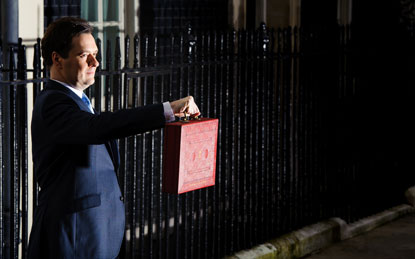By Vivienne Russell | 20 March 2013
Chancellor George Osborne has increased the scale of the public spending cuts he is seeking from the June Spending Review by £1.5bn.

In today’s Budget statement, Osborne said a total of £11.5bn in savings would be sought, up from the £10bn he announced last year, with further public pay restraint expected to make a contribution.
Whitehall departments are to have 1% docked from their budgets in each of the next two years in a bid to keep public spending under control and help bring borrowing down. ‘We’ve got to go on making difficult decisions so Britain can live within its means,’ he told the House of Commons.
Schools and health are to be protected during this two-year squeeze, and local government and police budgets will remain unaffected in the first year. The government will also fulfil its promise to devote 0.7% of national income to international aid.
Details of how the cuts will be made will be set out at the June 26 Spending Review.
But the chancellor did confirm that he was expecting a proportion of the cuts to come from the public sector pay bill. Salary rises would be capped at 1% in 2015/16 and annual pay progression increases would be scrapped or severely limited.
Such increases were ‘difficult to justify when others in the public sector and millions more in the private sector have seen pay frozen or cut,’ said Osborne.
‘I know that is tough but it is fair. In difficult times, with the inevitable trade-off between paying people more and saving jobs, we should put jobs first.’
Military personnel would be exempted from any cuts to pay progression.
Osborne also announced that Chief Secretary to the Treasury Danny Alexander and Cabinet Office minister Francis Maude had identified £5bn in efficiency savings, which would ‘go a huge way’ to achieving the Spending Review target.
A new limit would also be introduced on a ‘significant proportion’ of Whitehall’s Annually Managed Expenditure – to ‘bring real control to areas of public spending that had been out of control’, the chancellor said.
Annually Managed Expenditure, which includes most of the welfare budget, debt interest payments and payments to the European Union, was ‘in practice… annually unmanaged expenditure’.
Details of how it would work have been deferred to the Spending Review.
The Budget statement also revealed that Whitehall departments had under-spent by a total of £11bn this year, thanks to the ‘tough financial control’ exerted by Alexander. This was £3.4bn more than the independent Office for Budget Responsibility had forecast.
Carl Emmerson, deputy director of the Institute for Fiscal Studies, told the BBC this under-spend had contributed to the falling deficit, which Osborne said was now down by a third from 11.2% in 2009/10 to 7.4% this year. The deficit is forecast to fall to 6.8% next year and reach 2.2% by 2017/18.
Osborne confirmed plans to offer tax-free childcare vouchers to working parents, equivalent to 20% of the first £6,000 of their nursery or childminding bills.
The commitment to implement Andrew Dilnot’s recommendations on the funding of long-term social care was also restated. Changes are to be brought in from 2016, with the care cost cap set at £72,000 and the means-testing threshold at £118,000.





















